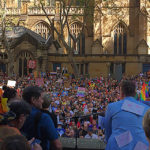New Trial Ordered for Adnan Syed

Adnan Syed turned 20 the year he was convicted of murdering his former high school girlfriend, Hae Min Lee.
Now, after serving 16 years of a life sentence, a Baltimore Judge has overturned his conviction and ordered a new trial.
The re-examination of evidence at his trial has largely occurred as a result of the popular podcast ‘Serial’, which, during its first season, raised questions around the reliability of key evidence used against Syed.
Baltimore Circuit Court Judge Martin P. Welch, who presided over Syed’s post-conviction relief hearing in February, released a 59-page judgment outlining his decision to grant a new trial.
Among other things, Welch found that Syed’s trial lawyer, the late Cristina Gutierrez, failed to challenge the reliability of potentially faulty cell-phone tower evidence – which constituted the “foundation” of the State’s case – a mistake so serious that it violated Syed’s right to effective counsel.
The Judge also found that Gutierrez acted unreasonably by failing to contact Syed’s potential alibi, Asia McClain.
Prosecution Evidence
Hae Min Lee’s body was found in Leakin Park in 1999, the year before Syed was convicted of her murder.
Much of the case against Syed relied on cell-phone tower evidence.
Two calls used to place Syed in Leakin Park at the time when star witness Jay Wilds said the pair were burying Lee’s body were both incoming calls. However, when investigative lawyers subpoenaed his AT&T “subscriber activity report,” from which only selected entries were used at trial, the report said that while outgoing pings were accurate, “incoming calls are not reliable for determining location.”
Judge Welch found that Syed’s lawyer unreasonably failed to cross-examine the prosecution expert, thereby denying competent representation to her client.
Credibility of Star Witness
The credibility of the prosecution’s star witness, Jay Wilds, was also found to be questionable.
Wilds was Syed’s former classmate and acquaintance, the two having socialised and smoked cannabis together.
According to Wilds, Syed said was planning to kill Lee, and would need Wilds to pick him up after the deed was done. Syed then somehow talked Wilds into helping bury the body. But Wilds’ version of events changed significant across several police interviews, as well as during the trial.
Another contentious issue was that there was no physical evidence linking Syed to Lee’s murder, and no witnesses to them being together around the time of Lee’s disappearance or murder.
Questions were also raised about why police failed to properly investigate Lee’s current boyfriend, focusing almost exclusively on Syed instead.
Alibi
Police claim that Syed told them he could not remember the events in school on the relevant day, although they failed to record notes of this alleged statement until seven months later.
Syed could not produce an alibi for the day either. However, a person by the name of Asia McClain does remember – saying she spoke with Syed at Woodlawn Public Library on the day.
In fact, Ms McClain sent two letters to Syed immediately after his arrest saying that she – along with her boyfriend and his friend – remember seeing him that afternoon.
While Judge Welch did not feel McClain’s testimony alone would have resulted in a different outcome, he found it was unreasonable for Syed’s lawyers not to contact the potential alibi.
Hae Min Lee’s family are outraged by the decision to grant Syed a new trial, asserting he is responsible for her death.
Receive all of our articles weekly
Author

Sonia Hickey






